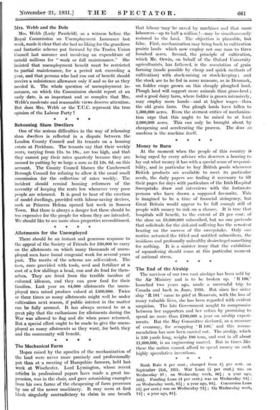The Mechanical Farm Hopes raised by the apostles of the
mechanization of the land were never more precisely and professionally put than at -a meeting of Hampshire farmers, held last week at Winchester. Lord Lymington, whose recent articles in professional papers have made a great im- pression, was in the chair, and gave astonishing examples from his own farms of the cheapening of farm processes by use of the newer machinery. It may seem at first blush • singularly contradictory to claim in one breath 'that labour "may-be saved by machines and that more labourers—up to half a million !—may be simultaneously restored to the land. The objection is plausible, but faLse. First, mechanization may bring back to cultivation prairie lands which now employ not one man to three hundred acres. Second, the principle of cultivation, which Mr. Orwin, on behalf of the Oxford University agriculturists, has fathered, is the association of grain farming (made possible by cheap and quick methods of cultivation) with stock-raising or stock-keeping ; and the stock are to be fed in some measure, as in Denmark, on fodder crops grown on this cheaply ploughed land. Plough land will support more animals than grass-land ; and a good dairy farm, where fodder is grown intensively, may. employ more hands—and at higher wages—than the old grain farm. Our plough lands have fallen to 1,300,000 acres. Even the sternest critics of mechaniza- tion urge that this ought to be raised to at least 2,000,000 acres.. This can only be brought about by cheapening and areelerating the process. The dews ex machina is the machine itself.
































































 Previous page
Previous page